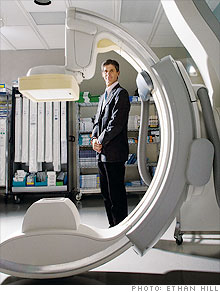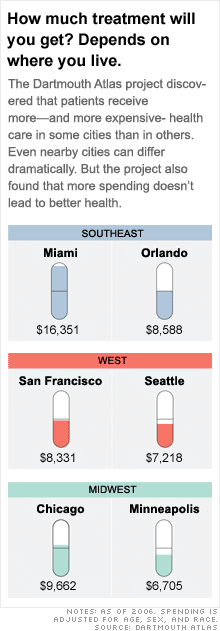Where health care costs the most (and least)
Dartmouth researcher Elliott Fisher says America could spend 20% less and be just as healthy. His work might be the key to fixing our broken system.
 |
| Fisher stands next to an imaging device used in cardiac procedures that he says are done too frequently. |

(Money Magazine) -- Health-care costs are pinching just about everyone. You feel it every time your co-pays and deductibles go up, and you feel it in your paycheck - rising employer premiums are leaving less money for salaries. Medicare is on its way to financial disaster within a decade. And 46 million Americans are without health insurance.
President Obama and congressional Democrats have put health-care reform at the top of their agenda. But how can we pay to cover the uninsured if we can barely afford the system we have today?
Elliott Fisher may have part of the answer. He was a practicing physician for 20 years and is now lead investigator for an innovative project called the Dartmouth Atlas of Health Care. The Atlas, founded by Fisher's colleague Jack Wennberg, has documented strange imbalances in health-care spending across the country. Whether your doctor orders a CAT scan or sends you to a specialist may depend on where you get sick, not just on how sick you are.
But guess what? The regions that use the most health care don't get better results. That finding has gotten a lot of attention within the Obama administration because it suggests that America could spend less on medicine and end up at least as healthy. Money contributing writer David Futrelle recently spoke with Fisher about what's gone wrong and how to fix it.
What's the evidence that we spend too much on health care?
We've looked at regional differences in Medicare spending and asked ourselves, What do you get when you spend more? What we found is that in higher-spending regions almost all the extra spending is on discretionary service. What that means in practice is unnecessary days in the hospital, unnecessary referrals to specialists, and unnecessary diagnostic tests.
How do you know the spending isn't making people healthier?
Survival following a heart attack or a hip fracture, or after a diagnosis of colon cancer, is no better in the higher-spending regions than in the lower-spending ones. More health care doesn't necessarily mean better health care. In fact, mortality rates in higher-paying regions are actually a little bit higher. Hospitals are dangerous places to be if you don't need to be there.
Because of the greater risk of picking up infections there?
Yes, but also because it increases the chance of medical errors. When you go to the hospital, someone has to write orders for every single one of your medications. Hopefully they get it right, but maybe they don't. Then they all have to be rewritten when you are discharged. Each time you move from one setting or doctor to another, there's another opportunity for confusion and mistakes.
Where is there the most overspending on health care?
Miami, Manhattan, and Los Angeles are expensive. Large Eastern urban settings seem to be particularly high cost, especially those that have a lot of medical schools, like Philadelphia. But they're not all urban areas. Eastern Long Island is one of the highest-cost places in the United States.
One driver of the differences in health-care spending is the local capacity. How many hospital beds - and how many beds in major medical-center hospitals - does an area have? How many physicians? Physicians must always stay busy to keep their practice profitable. Likewise, in hospitals a bed you have is a bed you fill. And in order for hospitals to offset the cost of caring for the uninsured, they must offer more highly profitable treatments to those who can pay. They're competing with one another to build the fanciest atriums, and they look like five-star hotels. They're bidding up orthopedics and cardiology salaries because those are revenue centers. That's what's driving up the costs of American health care.
So where is spending lower?
Minneapolis, San Francisco, Rochester, N.Y. You can find pairs of communities within the same state - such as Miami and Orlando - where the spending is radically different. It's very idiosyncratic.
Spending for Medicare would fall by about 20% if everybody practiced medicine the way the lowest-spending fifth of the nation does. The question is, How do we get there from here? We need local accountability, so that doctors and hospitals work together to provide better care at lower costs. We need to reform how providers get paid.
Under the system we have today, health-care providers are rewarded only for doing more stuff, not for providing better outcomes. And we need performance measures to show that the doctors aren't stinting on needed care to save a few bucks.
But what makes you think you know better than doctors how best to treat their patients?
None of us want the government telling physicians how to do their job. We want better information about the risks and benefits of specific treatments, and we want patients to be empowered to make better choices.
There have been plenty of examples over the past 20 years of treatments being recommended by physicians that turned out to be riskier than we thought. Hormone replacement therapy for women is the poster child for this.
Do doctors really have the time to think about the costs?
Most want to hustle you in and out of their office pretty quickly. This is the paradox of our situation. Payers, both insurance plans and Medicare, have been squeezing the prices for individual services like office visits. What does that force the doctor to do? Shorten the visit from eight minutes to five. And to schedule more appointments than necessary to keep their offices full. The thinking seems to be: Let's crank 50 patients through the office today. And by the way, if I own a CAT scanner I'm going to order a scan on a few of them because that's how I really make my money.
Doctors are afraid of being sued. Does that contribute to excessive treatment?
Fear of malpractice suits is universal among physicians. It's sometimes a legitimate reason to order tests, and it's sometimes an excuse.
How can a patient keep from being subjected to all these needless tests and procedures?
You should go to your doctor with an attitude of healthy skepticism. And don't be afraid to ask questions. Do I really need this CAT scan? Do I really need to go to a specialist? If you don't feel as if you've gotten adequate answers from your doctor, go to another doctor.
Medicare is soon going to bust the U.S. budget. Could the changes you are talking about prevent that?
If you reduced expected spending growth in Medicare by one percentage point per year below where it is now, you would save over $1 trillion over the next 15 years. Medicare goes from the red to being in the black.
Could the cost savings be enough to enable us to insure everyone?
If we fixed the way we deliver care so that doctors are rewarded for providing good care at low cost, we could afford it. We have an incredible opportunity to make American medicine the envy of the world, and cover everybody. ![]()


